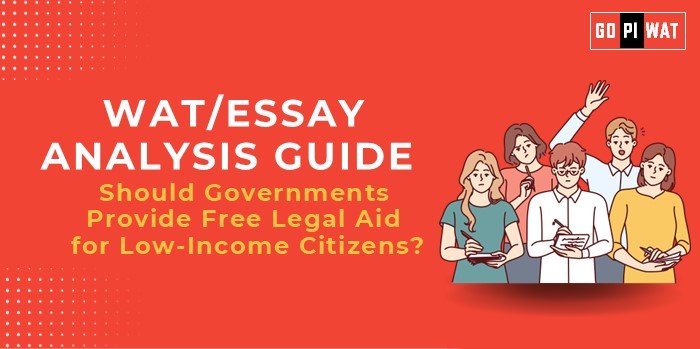📋 Should Governments Provide Free Legal Aid for Low-Income Citizens?
🌐 Understanding the Topic’s Importance
Free legal aid programs play a crucial role in reducing socio-economic inequalities and upholding the principles of justice and democracy. For low-income citizens, access to legal aid ensures that justice is not a privilege but a universal right. This topic intersects with public policy, ethical leadership, and the broader framework of social justice, making it significant for future leaders and decision-makers.
🗓️ Effective Planning and Writing
- ⏱️ Time Allocation:
- Planning: 5 minutes
- Writing: 20 minutes
- Reviewing: 5 minutes
- 📊 Preparation Tips:
- Research successful models like Sweden’s legal aid system.
- Understand challenges faced by developing countries in implementing free legal aid programs.
📝 Introduction Techniques for Essays
- ⚖️ Contrast Approach: “While justice is universal, accessing it remains a privilege for many low-income citizens. Free legal aid programs aim to address this inequity but face challenges in implementation.”
- 💡 Solution-Based: “Providing free legal aid is a step toward inclusive justice systems. However, its success depends on overcoming funding and resource barriers.”
- 📜 Timeline Approach: “From early 20th-century legal aid initiatives to modern public defender systems, the evolution reflects humanity’s quest for equitable justice.”
📚 Structuring the Essay Body
- 🏆 Achievements:
- ✨ India’s Legal Services Authority Act: Provides free legal aid to marginalized groups.
- 📘 Scandinavia’s Robust Legal Aid Programs: Exemplify equitable access and quality service.
- ⚠️ Challenges:
- 💰 Funding Shortages: Many nations struggle to allocate sufficient resources.
- ⚖️ Quality Issues: Public defenders often lack training and support.
- 📋 Resource Allocation: Uneven distribution leads to inefficiencies.
- 🔮 Future Outlook:
- 💼 Increased Funding: Governments must allocate a fixed GDP percentage to legal aid.
- 📡 Technology-Driven Solutions: Leverage AI and digital platforms to streamline processes.
- 🌍 International Collaborations: Share best practices to strengthen legal aid frameworks globally.
📄 Concluding Effectively
- ⚖️ Balanced Perspective: “Free legal aid embodies the essence of justice for all but requires systemic reforms to fulfill its potential.”
- 🌍 Global Comparison: “While free legal aid is a fundamental right in many countries, its implementation varies widely, reflecting both the opportunities and challenges ahead.”
🌟 Recommendations for Sustainable Progress
- 💰 Increase Budgets: Allocate a fixed percentage of GDP to legal aid programs.
- 💻 Leverage Technology: Use AI and digital platforms to streamline services and reduce bottlenecks.
- 🎓 Train Legal Aid Lawyers: Enhance the quality of public defenders through specialized training programs.
📄 Sample Short Essays
- ⚖️ Balanced Perspective: “Justice without accessibility is hollow. Free legal aid programs are a crucial step toward bridging socio-economic gaps, but their success hinges on addressing inefficiencies and ensuring adequate funding.”
- 💡 Solution-Oriented: “To ensure free legal aid fulfills its promise, governments must prioritize funding, adopt technology solutions, and draw lessons from global best practices.”
- 🌍 Global Comparison: “Countries like Sweden demonstrate the potential of well-funded free legal aid systems, while developing nations highlight the urgent need for resource allocation and legal reforms.”


